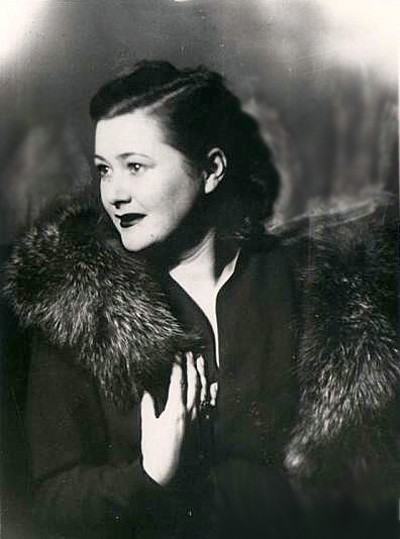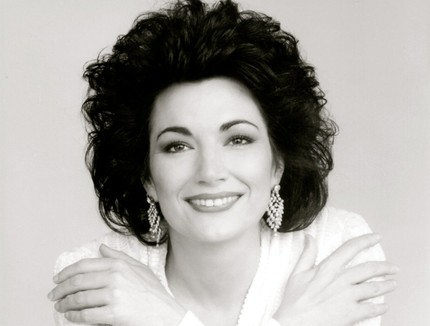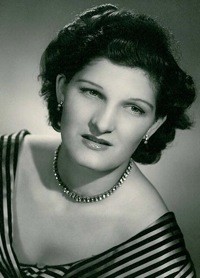
Maria Nikolaevna Zvezdina (Maria Zvezdina) |
Maria Zvezdina
She performed at the Bolshoi Theater from 1948 to 1973. Professor E. K. Katulskaya, formerly a well-known performer of the role of Gilda in G. Verdi’s opera Rigoletto, wrote in a review after listening to the debut performance of a young graduate of the Kyiv Conservatory in the performance of the Bolshoi Theater Rigoletto on February 20, 1949: “Having a sonorous, with a silvery voice and bright stage talent, Maria Zvezdina created a truthful, charming and touching image of Gilda.
Maria Nikolaevna Zvezdina was born in Ukraine. As the singer recalled, her mother had a very good voice, she dreamed of becoming a professional actress, but her grandfather forbade even thinking about a singing career. The mother’s dream came true in the fate of her daughter. After graduating from school, young Maria first enters the Odessa Music College, and then the vocal department of the Kyiv Conservatory, where she studies in the class of Professor M. E. Donets-Tesseir, an excellent teacher who brought up a whole galaxy of coloratura singers. The first public performance of Maria Nikolaevna took place in 1947 during the celebration of the 800th anniversary of Moscow: a student of the conservatory took part in solemn anniversary concerts. And soon, by that time already a soloist of the Bolshoi Theater, she was awarded the title of laureate at the II International Festival of Democratic Youth and Students in Budapest (1949).
Maria Zvezdina sang on the stage of the Bolshoi Theater for a quarter of a century, performing almost all the leading parts of the lyric-coloratura soprano in classical Russian and foreign opera performances. And each was marked by her bright individuality, the accuracy of the stage design, and noble simplicity. The main thing that the artist has always striven for in her work is “to express diverse, deep human feelings by singing.”
The best parts of her repertoire are considered to be the Snow Maiden in the opera of the same name by N. A. Rimsky-Korsakov, Prilepa (“The Queen of Spades” by P. I. Tchaikovsky), Rosina (“The Barber of Seville” by G. Rossini), Musetta (“La Boheme” by G. Puccini), Zerlin and Suzanne in Mozart’s Don Giovanni and Le nozze di Figaro, Marceline (L. van Beethoven’s Fidelio), Sophie (J. Massenet’s Werther), Zerlin (D. Aubert’s Fra Diavolo) ), Nanette (“Falstaff” by G. Verdi), Bianca (“The Taming of the Shrew” by V. Shebalin).
But the part of Lakme about the opera of the same name by Leo Delibes brought the singer special popularity. In her interpretation, the naive and gullible Lakme at the same time conquered with a huge force of love and devotion to her homeland. The singer’s famous aria Lakme “with bells” sounded incomparably. Zvezdina managed to brilliantly overcome the originality and complexity of the part, demonstrating virtuoso vocal skills and excellent musicality. The audience was especially struck by the singing of Maria Nikolaevna in the last, dramatic act of the opera.
Strict academicism, simplicity and sincerity distinguished Zvezdina on the concert stage. In the arias and romances of Tchaikovsky, Rimsky-Korsakov, Rachmaninoff, in the vocal miniatures of Mozart, Bizet, Delibes, Chopin, in Russian folk songs, Maria Nikolaevna sought to reveal the beauty of the musical form, to create an artistically expressive image. The singer toured a lot and successfully around the country and abroad: in Czechoslovakia, Hungary, Finland, Poland, Austria, Canada and Bulgaria.
The main discography of M. N. Zvezdina:
- Opera by J. Massenet “Werther”, part of Sophie, recorded in 1952, cho and VR orchestra conducted by O. Bron, with the participation of I. Kozlovsky, M. Maksakova, V. Sakharov, V. Malyshev, V. Yakushenko and others. (Currently, the recording has been released by a number of foreign companies on CD)
- Opera by N. A. Rimsky-Korsakov “The Legend of the Invisible City of Kitezh and the Maiden Fevronia”, part of the bird Sirin, recorded in 1956, chorus and orchestra of the VR conducted by V. Nebolsin, with the participation of N. Rozhdestvenskaya, V. Ivanovsky, I. Petrov, D. Tarkhov, G. Troitsky, N. Kulagina and others. (Currently, a CD with the recording of the opera has been released abroad)
- Opera Falstaff by G. Verdi, part of Nanette, recorded in 1963, choir and orchestra of the Bolshoi Theater conducted by A. Melik-Pashayev, with the participation of V. Nechipailo, G. Vishnevskaya, V. Levko, V. Valaitis, I. Arkhipova and etc. (The recording was released on gramophone records by the Melodiya company)
- The singer’s solo disc, released by Melodiya in 1985 in the series From the History of the Bolshoi Theatre. It includes excerpts from the operas Falstaff, Rigoletto (two duets of Gilda and Rigoletto (K. Laptev)), Susanna’s inserted aria “How the Heart Trembled” from Mozart’s opera Le nozze di Figaro, excerpts from the opera Lakme by L. Delibes (as Gerald – I. S. Kozlovsky).





